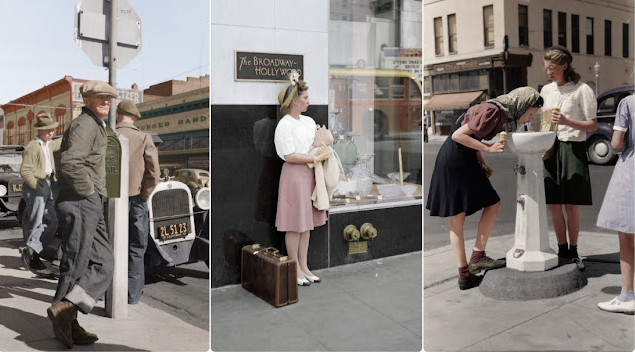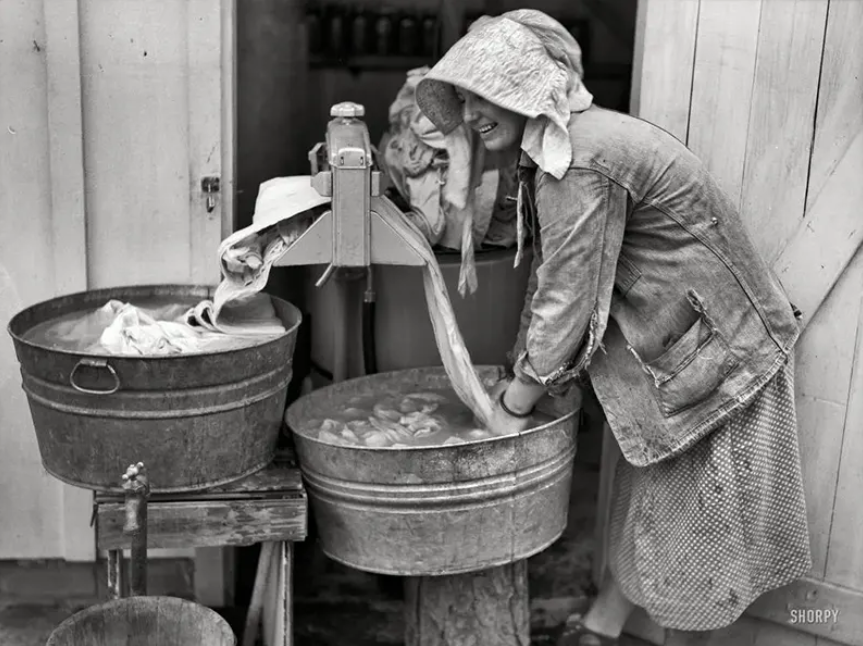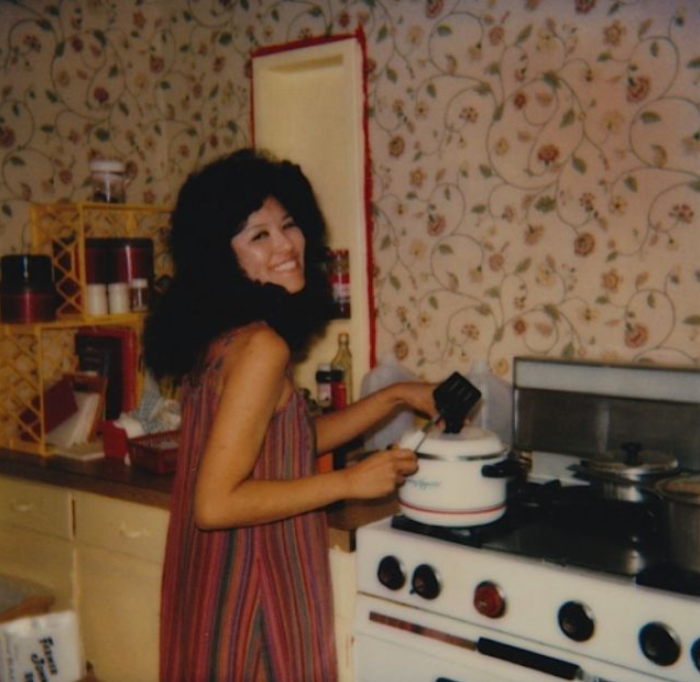Ringling Bros. and Barnum & Bailey Circus, affectionately known as “The Greatest Show on Earth,” holds a remarkable place in American entertainment history.
These fascinating Kodachrome photographs were taken by Charles Weever Cushman in the 1940s.
The foundations of the circus can be found in the pioneering efforts of several key individuals. Phineas Taylor Barnum, an entertainment visionary, established “P.T. Barnum’s Grand Traveling Museum, Menagerie, Caravan & Hippodrome” in 1871.
This circus was notable for blending traditional European circus acts with a menagerie of exotic animals and captivating curiosities.
Concurrently, the Ringling Brothers—Albert, Otto, Alfred, Charles, and John—ventured into the world of circus entertainment in the late 19th century.
They initially operated separate circus enterprises before eventually joining forces and officially forming “Ringling Bros. World’s Greatest Shows” in 1884.
The Ringlings’ circus initially centered on equestrian performances and later incorporated acrobatics and other traditional circus acts.

All five Alzanas Highwire performers at Ringling Circus.
The Ringlings purchased the Barnum & Bailey Greatest Show on Earth in 1907 and ran the circuses separately until 1919.
By that time, Charles Edward Ringling and John Nicholas Ringling were the only remaining brothers of the five who founded the circus.
They decided that it was too difficult to run the two circuses independently, and on March 29, 1919, “Ringling Bros. and Barnum & Bailey Combined Shows” debuted in New York City.
The posters declared, “The Ringling Bros. World’s Greatest Shows and the Barnum & Bailey Greatest Show on Earth are now combined into one record-breaking giant of all exhibitions.”
Charles E. Ringling died in 1926, but the circus flourished through the Roaring Twenties.

Clown Emmett Kelly Tramp.
In 1929, the American Circus Corporation signed a contract to perform in New York City. John Ringling purchased American Circus, the owner of five circuses, for $1.7 million.
In 1938, the circus made a lucrative offer to Frank Buck, a well-known adventurer and animal collector, to tour as their star attraction and to enter the show astride an elephant.
The circus suffered during the 1930s due to the Great Depression but managed to stay in business.
After John Nicholas Ringling’s death, his nephew, John Ringling North, managed the indebted circus twice, the first from 1937 to 1943.
Special dispensation was given to the circus by President Roosevelt to use the rails to operate in 1942, in spite of travel restrictions imposed as a result of World War II.

Clown Felix Adler.
In the 1950s, there was one gigantic train system comprising three separate train loads that brought the main show to the big cities.
The first train load consisted of 22 cars and had the tents and the workers to set them up; the second section comprised 28 cars and carried the canvasmen, ushers, and sideshow workers; the third section had 19 sleeping cars for the performers.

Elephant and Mademoiselle Unus.
After 1957, the circus no longer exhibited under its own portable “big top” tents, instead using permanent venues such as sports stadiums and arenas.
In 1967, Irvin Feld and his brother Israel, along with Houston Judge Roy Hofheinz, bought the circus from the Ringling family.
In 1971, the Felds and Hofheinz sold the circus to Mattel, buying it back from the toy company in 1981.
Since the death of Irvin Feld in 1984, the circus had been a part of Feld Entertainment, an international entertainment firm headed by his son Kenneth Feld, with its headquarters in Ellenton, Florida.
With weakening attendance, many animal rights protests, and high operating costs, the circus performed its final show on May 21, 2017, at Nassau Veterans Memorial Coliseum and closed after 146 years.

Elephant and Miss Unus.

The Alzanas of the high wire.

Two Alzanas hang out their wash.

Flying Trapeze star Antoinette Concello.

Flying Concello doing some washing.

Baton wielder takes time out for a break.

A ‘circus beauty’ in pale lavender cap, coat and shorts.

Rose Behee of the Flying Behees.

‘A charming aerialist’.

Rose Behee and brother-in-law.

Rose Behee of the Flying Behees.

The Flying Concellos.

Two young German girls in head-on-head balancing act.
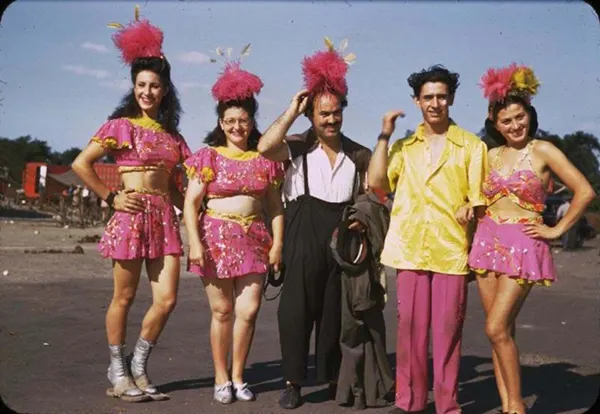
Trick bicycling act.

Mrs Harold Alzana.

Alzana in costume for Gold Rush tableau.

Francis Brunn and his sister – a juggling act.

Harold Alzana.
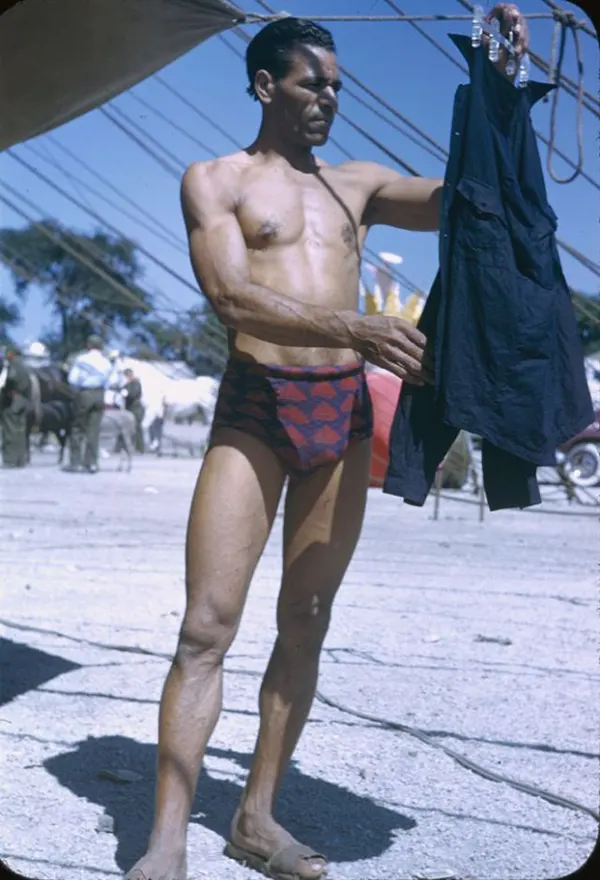
Rola Rola Man.

Barnum & Bailey Greatest Show on Earth poster, c. 1899.

Circus train rolling through Safety Harbor, Florida.

Circus clowns, 1906.

Frank Buck, star attraction, 1938.
(Photo credit: Charles Weever Cushman / Library of Congress / Pinterest).
